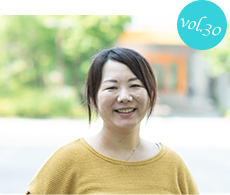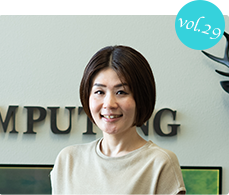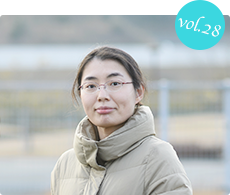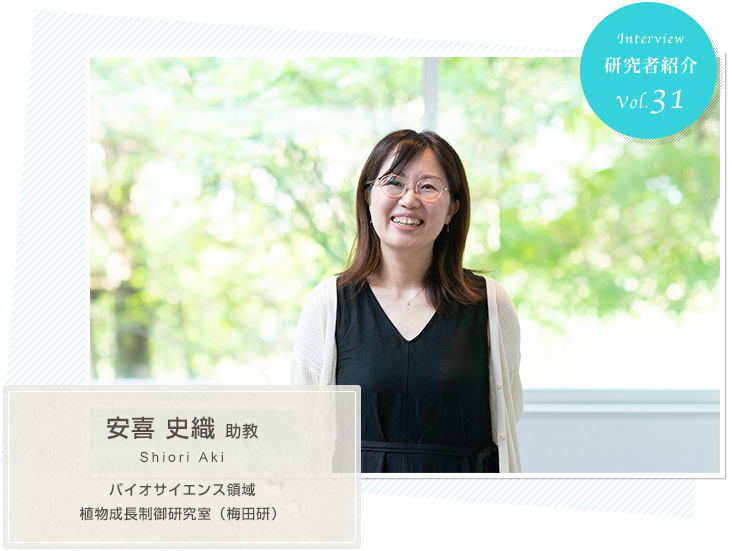
![]()
She received her Ph.D. from the Graduate School of Science, Kyoto University in 2011. After working in a company, she became a postdoctoral researcher at Nara Institute of Science and Technology in 2013. She has been engaged in research on regulation of cell division and differentiation and maintenance of genome stability by plant hormones.
Path to becoming a researcher
When I was in high school, I was not good at biology and my exam scores were poor, but I liked biology class. I grew up in the countryside and was always interested in nature, but the teacher at the time was very interesting. He told me stories about field research he had done as a student, and I decided that I wanted to major in biology when I went to college. In biology class, I became interested in "Mendel's Laws". I thought it was interesting that there were rules that allowed different people to be born from the same father and mother. I thought it would be even more interesting to know if something outside the rules could happen.
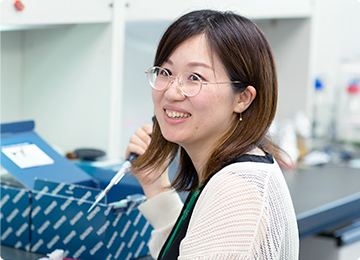
In college, I really wanted to study biology, so I went to the Faculty of Science at Ehime University, where I could only take the entrance exam with chemistry, which I was good at at the time, and did research on yeast. I then entered the Graduate School of Science at Kyoto University to study plant molecular genetics. When I was an undergraduate, I thought I would work as a researcher in a company after getting my Ph.D. But when I entered Kyoto University, many people around me continued their research at the university, and they all seemed to enjoy it so much that I began to think that becoming a researcher at the university was a possibility.
After my Ph.D., my mentor and others expected me to go abroad as a postdoc, but I thought I had the opportunity to be in a completely different environment, so I got a job with a company that imports and exports research reagents and was assigned to the overseas sales department. I worked there for less than two years, but I didn't feel as excited or driven as I had when I was doing research at the university. The company's first priority was to keep the business running smoothly, and individual knowledge had to be put into manuals and shared throughout the organization. Even if I were to leave now, this company would not have any problems. At a time when I was thinking about this, I decided to return to academia, partly because my mentor told me to come back.
I had known Dr. Umeda of my current lab since I was a student, and my former teacher told me that the Umeda lab was looking for a postdoctoral researcher, so I applied and was hired. I have been working under Dr. Umeda ever since.
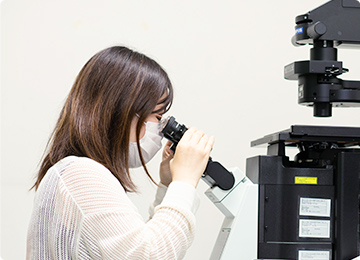
My current research interests are the same as when I was a postdoc: regulation of cell division and differentiation and maintenance of genome stability by phytohormones. Plants are really flexible and tough. It is interesting to learn new things now, no matter how small. I like the fact that I am the only one who knows about it, even if it is not so important for others.
Balancing research and life
In the morning, I drop my child off at elementary school around 7:30 a.m., leave the house around 8:00 a.m., and arrive at the university around 8:30 a.m. During the day, I have research and deadlines. During the day, when I have research to do or a deadline to meet, I work at my desk in front of my PC, and on the other hand, there are days when I spend all day in the lab doing experiments. It is like being on a bike all the time. Nevertheless, I always try to answer students' questions as soon as I receive them. I am always ready to answer questions when called upon, even when I am doing my own work or experiments.
Currently, I am responsible for many students, including a newly enrolled first-year master's student. I have been taking care of students since I was originally enrolled as a postdoctoral researcher, and I really enjoy watching them grow. They are all so sweet. It may sound exaggerated, but it is my reason for living.
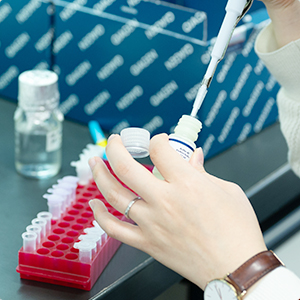
I think it has to do with the education I have received so far. I remember that all the teachers who were involved in my life were wonderful and took very good care of me. Many of the teachers always took care of me while encouraging me to stand on my own. Umeda-sensei was no different. No matter how small a problem I had, he always responded. That is why I want to be like that with the students I am responsible for.
When I leave the university around 6:30 p.m., I pick up my child from school and have dinner with my family when I get home. After that, I take a bath, clean up, and have all my housework done by 9:00 p.m. The children go to bed at 9:00 p.m., so I have two hours of nighttime housework and childcare from 7:00 p.m. to 9:00 p.m. I have always thought that parenting is only one hour in the morning and two hours at night. When I leave my children in day care centers, etc., I only have to take care of them for 3 hours and they grow up on their own. I am grateful for that. I usually work after 9:00 p.m. on weeknights.
Sometimes I come to the lab on weekends to do my own research, and sometimes I work from home when I am in a pinch, but I try to make the most of my family time. I try to spend as much time as I can with my family. One way to refresh myself is to talk about trivial things with my children when I put them to bed at night. We talk about things that happened at school or nothing at all. I feel the growth of my children when I talk to them.
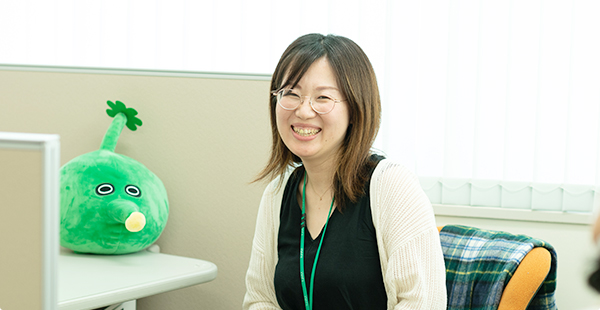
Research Environment and Challenges at NAIST
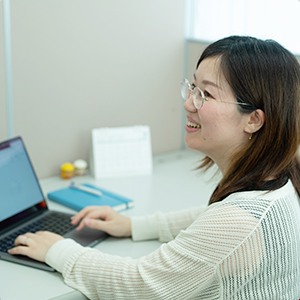
The number of female faculty members is gradually increasing, and I do not feel any prejudice against women at the university, but I wonder if women of the same generation or a generation a little younger than me are able to give birth at the time they want, if they choose to have a baby or not, and if they are making good choices about their lives. I wonder if I am making good choices in my life. Being a college teacher is not a job that can be replaced. There may be substitutes for elementary, middle, and high school teachers, but there is no substitute for an assistant professor at a university. Research will inevitably slow down, and if you have a number of students assigned to you, you may not be able to have a baby when you want to.。
This is because I feel that there are not many colleagues, especially women, who have children. I think that while they are thinking about their research and when the students they are responsible for will graduate, their schedules are being pushed back more and more. This makes it more and more difficult to have a baby, no matter how advanced the medical care is.
It's hard to say in general what the university can do to create an environment that supports this choice; it's what the person wants, isn't it? If you want to go back to work two months after giving birth, I think you need a babysitter, but if you want to take your time with fertility treatments or take a year of maternity leave, you may want to have a replacement faculty member. You don't want to burden your colleagues with your choice. Of course, it would be nice to have someone like a concierge to help people make the best choices for themselves, regardless of whether it is just having a baby. It would be wonderful if we could create an environment where young people could balance both work and personal life without worry.
(August 2022)

-
2022.8 updated
Division of Biological Science
-
2022.8 updated
Division of Information Science
-
2022.3 updated
Division of Biological Science






